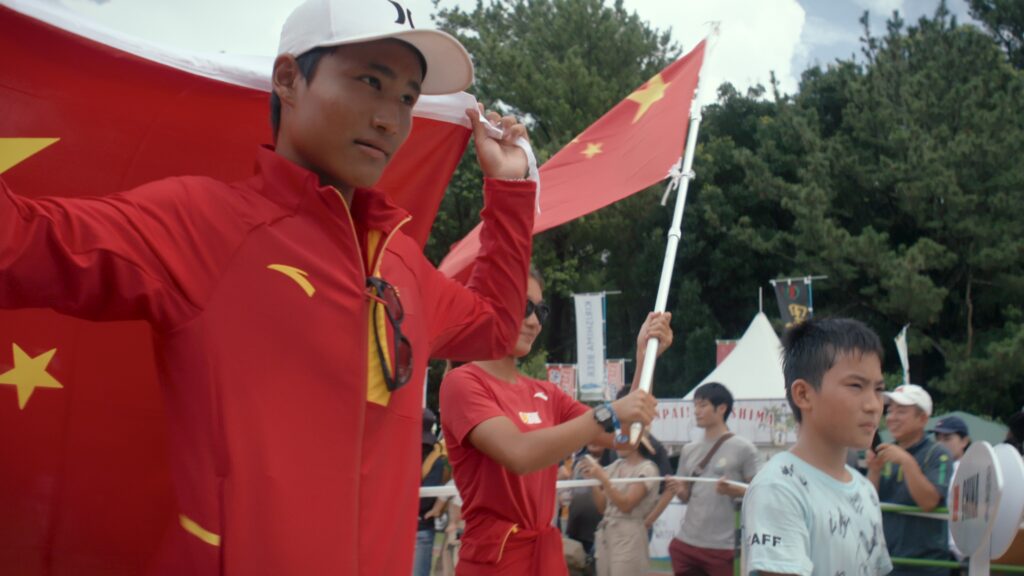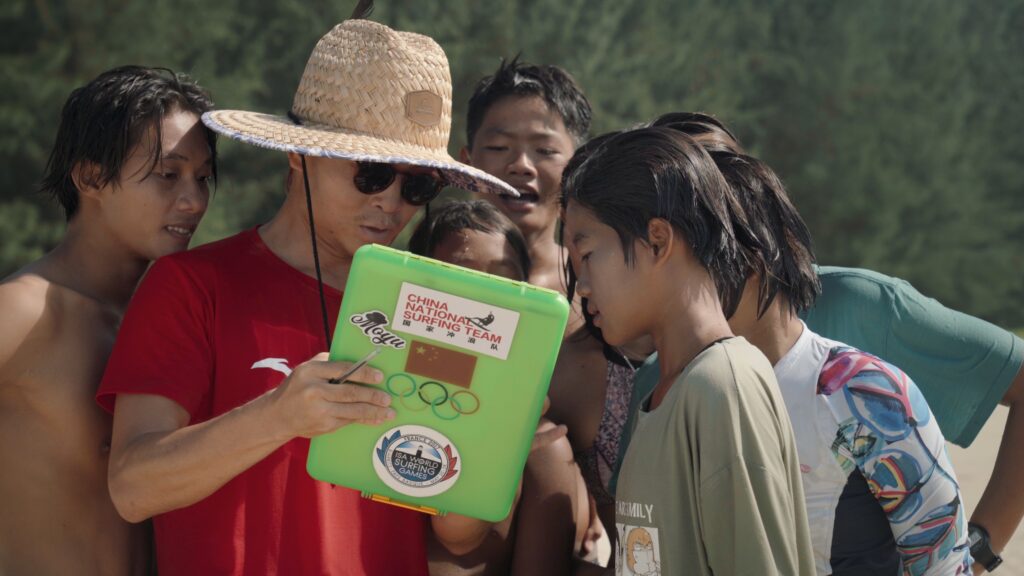Meet The Chinese Surf Program That Made Siqi Yang
Inside the rigid world of Chinese competitive surf training.
Editor’s note: 15-year-old Siqi Yang has been nothing short of sensational at this year’s surfing Olympics. The first-ever Chinese qualifier made a heat in the main event before losing in the third round to World Champ Caroline Marks, but more impressively she packed an alarming number of plus-sized tubes on her backhand at a wave she’d never surfed before this year. While Siqi is not a star in this film, it does showcase the program that got her to where she is today.
There are rumblings in the South China Sea and a delicate tension in the waters of Hainan Island.
Operations conducted and national strategies employed, all in the name of bringing glory to The Red Dragon. It’s real, it’s serious, but it has nothing to do with territorial disputes nor military installations on artificial islands. This is about bottom turns, cutbacks, and airs.
Hordes of teenagers stand in ovation as a party official enters a public hall. He takes his seat at the podium and addresses the young crowd: “After 5000 years of China’s glorious history, we stand here the closest ever to becoming the world’s strongest nation. Getting the gold medal will win glory for China. It will prove to the world that the Chinese people are the greatest in the world.”
Mr. Li, Secretary of the Chinese Water Sports Administration, zeroes in on the teenage imagination with his rousing speech: “Once you’ve accomplished your goal, imagine how great your self-worth will be. How many of your peers will envy you, admire you, revere you. You’d be a valuable member of society. The only way to reflect your worth is by winning the championship and getting first place.”

The teenagers clap nervously, and rightly so — The Chinese National Surf Academy is not your average surf camp. These selected youngsters are being trained for qualification for the newest sport in the 2020 Olympics, another field to display China’s sporting excellence in.
Canoers, divers, swimmers, sailors — virtually any Chinese child with a propensity for water sports has been sent here at taxpayer expense in the hopes of finding the nation’s first surfing gold medalist.
The pressure is on. The Olympics are looming. International coaches have been flown in, and intense weight training, running schedules, and complex cognitive exercises are all employed in hopes of fast-tracking the many years it takes to become a skilled surfer.
Any slip-ups, and you’re immediately cut from the academy and sent home. Mr. Ma, director of the Chinese National Surf Team, puts it bluntly, “Whether you are on the National Team or the Olympic team, it’s not permanent. You’re all here by recommendation, but if you slip, you’re out.” He continues, “If you’re late, or leave early, or disobey, the coach can smack your bum with a stick.”

This is the setting for the enthralling new documentary Surf Nation, which portrays two young Chinese surfers, “Alex” Qiu Zhuo and “Lolo” Luo Ling, as they navigate their career ambitions and love of surfing in the wake of their nation’s awakened interest in the sport in 2019, leading up to the 2020 Tokyo Olympic Games.
Alex, 15, is the Chinese National Surfing Champion and by far the most promising competitive surfer China has produced a time of filming. The trouble is he knows it too. He is cocky, confident, rebelliously eloquent, and insatiably ambitious. He dreams of the CT and the world title, nothing else.
All this focus on the Olympics seems to bore him, he couldn’t care less about the success of the Chinese Surf Team — surfing is an individual sport, and so is its glory.
“What are your future goals as a surfer?” A newscaster asks him post-heat. “I want to try and be on the CT.” The newscaster tries again. “Can you just tell me, and you can answer, ‘One of my other goals would be to be in the Olympics.'” Alex clears his throat and thinks for a moment. “I want to try and be on the CT.”

This is Alex’s predicament — as China’s best surfer he’s their best bet at Olympic glory, but his approach to surfing is staunchly individualistic and diametrically opposed to the collectivist ideals of his country.
He makes for a perfect documentary subject — swears profusely, draws dicks in the dust that has settled on cars, ignores his coaches, and practically robs the Los Angeles Hurley store (his sponsor). In many ways he’s just your average 15-year-old, save for the fact that the sporting ambitions of an entire nation are resting on his shrugged shoulders.
Lolo, the other surfer documented, is like a negative image of Alex. Whereas Alex is caught between the enormous weight of his own expectations and that of his nation, surfing as a career is passing Lolo by. At 21, she’s told she is too old to be a Chinese athlete, and that her best bet at employment would be as an assistant coach, or a coach if she gets lucky.
Lolo finds herself in limbo. She doesn’t love competing as much as the others, she finds the Surf Academy tiresome, her parents have mounting expectations on her as an athlete, and she’s in constant battle with her domineering older boyfriend — who wants to marry her. All she really wants to do is surf. She loves it and appreciates it for what it is.

“I surf because the feeling is incomparable. It’s hard to describe… probably like the feeling of true love?” She ponders. “Then maybe I haven’t met someone I truly love.”
What these antagonistic portraits reveal are the enormous differences between their respective generations. As Lolo explains, many of her parents’ generation — the offspring of the cultural revolution — were denied education and the freedom of choice that a new middle-class begins to ponder. For a long time, the good life for the Chinese middle class was one where there was simply food on the table.
But for Alex and Lolo’s generation, vastly different ideas float around when it comes to what constitutes a good life. Ideas of personal fulfilment, well-being, and a career that reflects your passions rather than the needs of a nation.
Economic freedom can often lead to a sense of freedom to pursue desires, which is more commonly understood in Western societies. However, in a country where collective ideals have held sway for a long time, expressing these desires can be challenging.

If the film is any indicator of China’s surfing future, it won’t be long until we start to see some real contenders. Despite the general lack of good waves, the existential frictions between generations, or surfing as a relatively novel pastime, when China sets out to do something they don’t half-ass it.
Just this week, 15-year-old Siqi Yang — China’s first surfing Olympian — went tenaciously hard at her warm-up sessions at Teahupoʻo and has proceeded to make the third round, where she lost to reigning world champ Caroline Marks.
Unafraid of the Tahitian reef pass, Yang threw herself into treacherous west bowls with the verve of a gymnast flying into a foam pit, embodying the late Liang Qichao’s words: “If the youth are strong, the country will be strong.”
The Olympics can feel like a covert global competition, and it’s easy to get swept up in its fervor. If China’s claims of being the greatest nation in the world irk you, remember that we’re not entirely innocent of such pride ourselves.

While this focus on national pride complicates the surfing journey for the new generation of Chinese athletes, the film also showcases the growing number of young people discovering our cherished sport.
Regardless of their success as competitors, we find that the more people surf, the more the sport progresses. Who could argue with that?
Surf Nation can be streamed on WORLD Channel and YouTube.
Further reading: The Three Million Dollar Chinese Storm


















Comments
Comments are a Stab Premium feature. Gotta join to talk shop.
Already a member? Sign In
Want to join? Sign Up